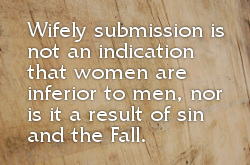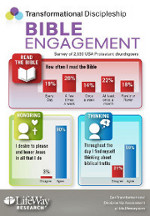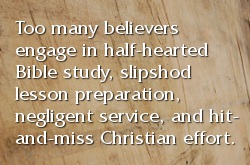Genesis, Submission & Modern Wives
 By Georgia Purdom. © Answers in Genesis. Used with permission. All rights reserved.
By Georgia Purdom. © Answers in Genesis. Used with permission. All rights reserved.
Common Misconceptions
The verses most commonly quoted concerning the wife’s role in relation to the husband’s role are Ephesians 5:22 and Colossians 3:18:
Wives, submit to your own husbands, as to the Lord (Eph. 5:22).
Wives, submit to your own husbands, as is fitting in the Lord (Col. 3:18).
Many women struggle with the concept of submission in marriage because they mistakenly equate being submissive with being inferior. From Genesis we know that men and women are equal in God’s eyes because everyone, regardless of gender, is made in God’s image. Genesis 1:27 states, “So God created man in His own image; in the image of God He created him; male and female He created them.”

 A sermon delivered at Calvary Baptist Church, Derby, Kansas. Reprinted with permission from
A sermon delivered at Calvary Baptist Church, Derby, Kansas. Reprinted with permission from
Discussion